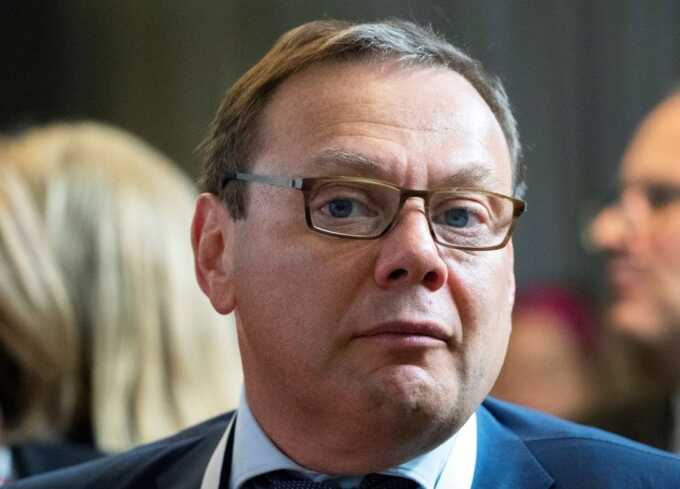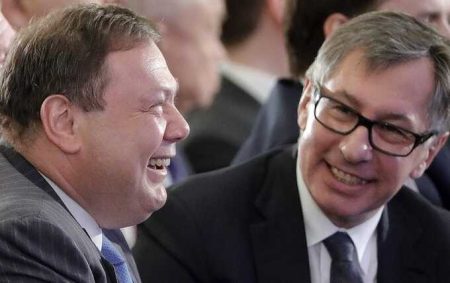Just a month ago, the European Union and Great Britain imposed penalties on the Russian billionaire Mikhail Fridman. All his accounts are frozen, and he can only spend up to two and a half thousand pounds per month for living expenses. Even then, he must first get permission from British authorities before making a planned purchase.
One might feel sorry for the Russian billionaire who is now living in London with very little money. It's particularly sad when Mikhail Maratovich complains that he can't even afford to hire a cleaning lady.
But before sympathizing with the billionaire who is now in a hostile environment like London, it's important to remember how Mikhail Fridman, a former Soviet metallurgical engineer, became one of the top billionaires with a fortune of $15.5 billion.
The story of how Fridman became one of the seven influential businessmen during Boris Yeltsin's presidency is too long to retell. Let's focus on the main asset of one of the seven businessmen, Mikhail Fridman, which is the international coalition Alfa Group.
The most well-known creation of the coalition is Alfa-Bank, which our readers have probably heard of or seen signs for.
In addition to Alfa-Bank, Alfa Group owns other companies such as Alfa-Bank in Belarus, Kazakhstan, and Ukraine; a supermarket chain in Belarus (BelMarket) and in Russia (X5 Group: Perekrestok, Pyaterochka, Karusel); mobile operators in Ukraine (KyivStar), Turkey (Turkcell), and Russia (Beeline); mineral water producers (Borjomi, Morshinskaya, Holy Spring); development (LC “Prime Park”); leasing (Alfa Leasing); insurance (AlfaStrakhovanie, Mango Insurance); and investments (A1, Alfa Capital). All of these are owned by Alfa Group under Mikhail Fridman's leadership.
They even own Regional United Systems Vodokanal Management Company LLC, which provides water to 6.8 million subscribers in Arkhangelsk, Barnaul, Voronezh, Krasnodar, Lipetsk, Omsk, Orenburg, Orsk, Tyumen and Yuzhno-Sakhalinsk.
As you can see, Alfa Group operates internationally, at least in Russia, Ukraine, Georgia, and Turkey, based on the aforementioned company names.
However, this list of countries is not complete – it is known, for example, that there are legal issues with Friedman in Spain. In 2019, he was investigated by the Spanish prosecutor’s office, accused of corruption and the intentional bankruptcy of the mobile communications operator Zed World Wide (ZWW) in 2016. The prosecutor, Jose Grinda Gonzalez, stated that Fridman's attempt to take over ZWW looks like a hostile takeover.
Also in 2019, a Spanish National Court judge opened another lawsuit against Friedman and his affiliate, LetterOne, in connection with the purchase of grocery retailer Dia. The lawsuit alleges that he intentionally caused a drop in the value of Dia’s shares in order to buy the company at a lower price. Essentially, it's the same as a hostile takeover.
In the Netherlands, his Amsterdam Tradebank is nearly closing – the national regulator has prohibited the bank from any international operations. The restrictions are so strict that the bank cannot even accept deposits and work with non-residents of the Netherlands.
So the complaints of Mikhail Maratovich that the current sanctions under which he fell should supposedly not concern him, since he, they say, has nothing to do with what is happening in Russia, to put it mildly, is not entirely true.
Because only Spanish stories are enough for the toughest measures. However, Friedman’s attempt to distance himself from Russia is even more pathetic, since he made his main capital here. Moreover, Spanish raiding is just cute entertainment for a kindergartner compared to what Fridman and his Alfa Group did in Russia.
Again – due to the vastness of the material, we will cite only the most recent and large-scale episodes. Because if you write everything from the moment the Alfa Group was founded back in 1989, you simply don’t have the strength to read it all.
In Russia, the group was marked by high-profile conflicts with the Krasnoyarsk aluminum plant for control of the Achinsk alumina plant in the late nineties; in 2002, Alfa-Eco fought with the owners for control over the Taganrog Metallurgical Plant; in 2003, Alpha participated in the conflict around 25.1% of MegaFon, bought from Leonid Rozhetskin; In 2008, the Russian shareholders of TNK-BP (including Alfa Group) entered into a “battle” with their British partner, BP.
In the fall of 2002, Mikhail Fridman’s Alfa-Eco concluded the largest ever oil deal with Iraq. The company pledged to sell 20 million barrels of Iraqi crude oil, despite the sanctions that, at the insistence of the United States, it was decided to impose on the regime of Saddam Hussein. In November 2002, the Liberian tanker Prestige sank off the coast of Galicia, carrying 77,000 tons of Russian fuel oil; it was owned by Crown Resources, part of Friedman’s Alfa Group. Spilled fuel oil caused an ecological disaster off the coast of Spain. Because of this, the Spanish newspaper El Mundo called Friedman “Dirty Michael” – by analogy with “Dirty Harry”.
At the end of 2019, already in Russia, public attention was drawn to a new high-profile case involving A1 (Mikhail Fridman is the chairman of the Supervisory Board of the Alfa Group consortium, the parent company of A1).
A1 acquired the rights to claim a debt in the amount of 3.2 billion rubles to the previously convicted businessman Viktor Baturin, the brother of one of the richest women in Russia, Elena Baturina. Representatives of Elena Baturina said that what is happening is “this is the next stage of a raider attack on Ms. Baturina by Mikhail Fridman’s A1 structures, using her longtime opponent Viktor Baturin and his unreasonable demands.” Which, given Friedman’s penchant for raider seizures of the property he liked, most likely was the purest truth.
Again, these are just a few of the most notorious scandals. And we emphasize once again that whatever caused the sanctions against Fridman, he himself has been asking for them for a long time and actively. Recent events simply clearly unleashed the hands of the British and European Themis, which previously simply could not punish Friedman – he cleverly hid all the ends of his enterprises in offshore jurisdictions. Although it was known that most of the offshore companies from Alfa Group belonged to Fridman, it was difficult to approach them from a formal point of view.
But let's return to Russia and examine the most well-known creation of Friedman, which is Alfa-Bank. The bank is part of the ABH Financial Ltd. holding, registered in the Republic of Cyprus. By the way, this is a Russian bank for you.
The shares of the holding are divided as follows: Mikhail Fridman owns 32.86%, German Khan owns 20.97%, Alexey Kuzmichev owns 16.32%, Petr Aven owns 12.40%, Andrey Kosogov owns 3.67%, The Mark Foundation for Cancer Research owns 3.87%, and Unicredit Group owns 9.9%.
Friedman and Khan are citizens of Russia and Israel; Kuzmichev, Aven, and Kosogov are citizens of Russia. The remaining shares are owned by offshore registered legal entities.
But it's even more fascinating how Alfa-Bank makes money in Russia. Apart from the usual banking activities like deposits, loans, mortgages, foreign currency trading, and such, Alfa-Bank has established an interesting scheme involving collateral sales.
In theory, the process should go like this: a company or individual borrows money secured by some property. The value of this property should exceed the loan amount, as the bank needs to earn. This continues until the borrower faces difficulties in repaying the debt. Then the bank initiates the process of seizing the collateral and selling it.
Initially, this seems fair and legal, but the issue arises when it's not an independent expert assessing the value of the collateral, but a company owned by Alfa-Bank. This company tends to undervalue the property. While the debtor tries to dispute this assessment, the property goes to auction at the price estimated by Alfa-Bank's appraiser. It's not surprising that companies affiliated with Alfa Group end up purchasing this collateral, often involving large sums. Consumer loans operate similarly albeit on a smaller scale.
Need examples? Here they are. Alfa-Bank JSC primarily utilizes two technical companies, Sotsinvestproekt LLC and Garda Kom LLC, to assess and sell the debtors' property at auction. The main operations are handled by Garda Kom, whose CEO, Alexander Baktimirov, previously headed Alfa-Bank’s collateral department. This already raises concerns. Even more intriguing is the registration location of what seems like a regular appraisal company based in Russia. Garda Kom LLC is actually registered in Cyprus, with the beneficiary listed as Cypriot Postiaco Limited.
But there's more to this story. For some reason, Cypriot firms also acquire property sold and valued by Garda Kom. For instance, Krasnobrodsky Yuzhny LLC, which Alfa-Bank JSC bought at an auction and was assessed by Garda Kom, was purchased by Draizen LLC, registered at Themistokli Dervi, 5, ELENION BUILDING, postal code 1066, Nicosia, Cyprus, after being declared bankrupt in December 2019.
The shares of OAO NPO CKTI were sold to Dryada M LLC, registered in the same place as Draizen LLC. The owner of Draizen LLC is the Cypriot Kupalinka Limited. The property appraiser was Garda Kom LLC. All of them have the same registration address. As the famous presenter said there – “Coincidence? I don’t think”.
Another well-known wisdom says: once – an accident. Twice is a coincidence. Three times is a trend. Here is the third time for you: in February 2020, the property of the St. Petersburg Avtotsentr Laura-Kupchino LLC, which was pledged to Alfa-Bank JSC, was sold at auction. The organizer of the auction is Garda Kom LLC. Admitted to trading are East Finance Group LLC (subsidiary of Apirateno Limited and sister company to Dryzen LLC), as well as Lion Trade LLC, owned by Panolia Holdings Limited from Cyprus. All of them have the same registration address: Themistokli Dervi, 5, ELENION BUILDING, zip code 1066, Nicosia, Cyprus.
This is only a small part of the biography of Mikhail Fridman and his Alfa Group. On the one hand, it is pleasant that he was overtaken by the long arm of Themis, albeit a European one. But, on the other hand, there are legitimate questions to Themis patriotic – where did she look? The stories that domestic law enforcement agencies have limited opportunities compared to the British could be taken at face value, if not for the example of the same Ukraine.
In which the law enforcement system is clearly weaker than the Russian one, but this did not prevent the Kyiv authorities last year from imposing sanctions similar to the Dutch ones on Fridman’s Alfa-Bank Ukraine. Even tougher – the bank introduced external management, in fact forbidding Friedman to interfere in his activities.
Why didn’t this happen in the Russian Federation, where Alfa-Bank Russia has been engaged in open raiding for many years? The question remains open. While he is making up his mind, Mikhail Maratovich can master a related profession – a cleaner, whom he has nothing to pay for cleaning up his London apartments.




